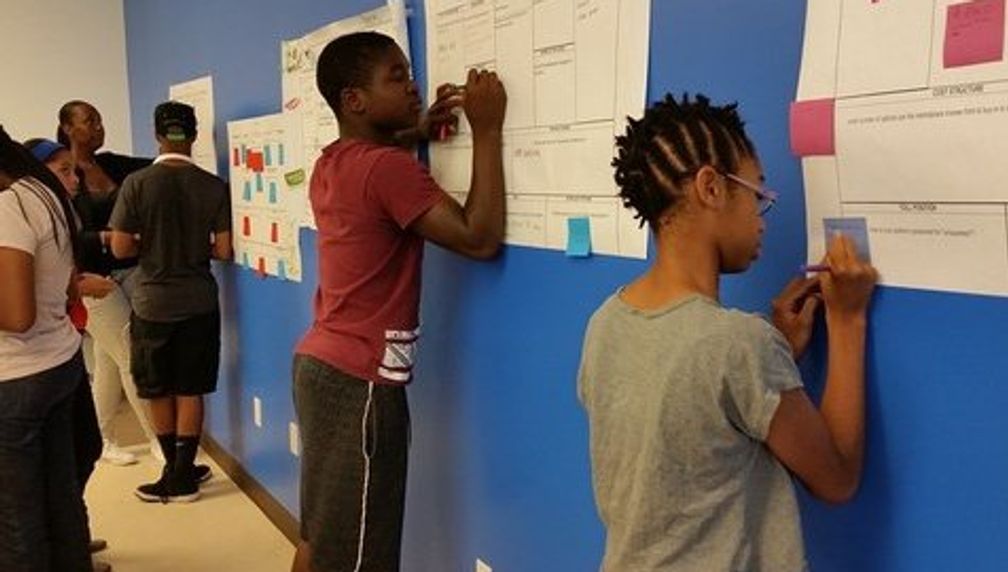Innov8-Helping Other Create Opportunities. South LAs Silicon Valley!
LASC Foundation partnered with Innovate Globally to create a synergistic program that accomplishes the following three goals: 1) educate students and South Los Angeles residents on the highly marketable skill of coding; 2) support business entrepreneurship by providing students and community members with “soup to nuts” business instruction and industry exposure for tech-related start-ups; and 3) ultimately create a sustainable “Innovation Ecosystem” that will encourage indigenous creativity.

In what areas of Los Angeles will you be directly working?
South LA
South Bay
LAUSD
Los Angeles Southwest College
How do you plan to use these resources to make change?
Engage residents and stakeholders
Implement a pilot or new project
Expand a pilot or a program
How will your proposal improve the following CREATE metrics?
Employment in the creative industries
Minority- and women-owned firms
Number of high growth startups
Venture capital investment
Measures of cultural and global economic influence (“soft power”) (Dream Metric)
Recruiting and retention rates for local higher education institutions (Dream Metric)
Percentage of graduates from local higher education institutions that remain in LA County 5 years after graduating (Dream Metric)
Unemployment rates (and opportunities) for the formerly incarcerated (Dream Metric)
Describe in greater detail how you will make LA the best place to CREATE.
LASC Foundation, in partnership with Innovate Globally and LASC’s Career and Technical Education School seek to create a “tech hub” in South Los Angeles.
1. Students are offered the Introduction to Innovation 72 (I2 I), a 6-week, non-credit class at LASC CTE. The course is an introduction to the core components of the Innov8 program—CodeTechIQ, DigiTechIQ and BizTechIQ.
a. CodeTechIQ—students are taught the “back-end of innovation”. They are provided with an introduction to computer coding, as well as a look at how coding is used in industry (web-based, mobile, gaming and other industries).
b. DigiTechIQ—students are taught “what drives innovation”. They are instructed on content creation (digital media, web and graphic design, infographics, etc.).
c. BizTechIQ—students are taught the “front end” of innovation”. They are given the skills to manage a tech start up. The students get lessons in project management, securing funding, making the pitch and overall business development.
2. I2I enables the student to determine their area of interest—Code, Digi or BizTech. Students are then put on an education track with more in-depth introductory course work in their area of interest. Upon completion of one semester of classes, the student receives a Certificate of Knowledge.
3. The students will then be placed in an 8-12 week internship with an Innov8 industry partner. The student gives the students the opportunity to get hands-on experience and continued education in a real-world work environment.
4. The students’ for-credit coursework at LASC CTE. The student earns a Certificate of Skill.
5. Students are eligible to participate in a Preceptorship—the opportunity to work with a Fast 5 team (coder, digi-technician, BizTech manager, a Masters Level Student from local University and an Industry Expert) to work with local entrepreneurs on a tech start- up. This is exciting for two reasons: a) it provides local entrepreneurs access to significantly discounted development expertise, helping to launch a successful tech-based business and b) it provides the Innov8 students the opportunity to get hands-on experience on launching a start-up, as well as projects to add to their professional portfolios.
6. Students are recommended to complete three Preceptorships. The students now have three options: a) four-year degree; b) employment in the tech industry with work experience and impressive portfolios; or c) launch their own start-up.
Please explain how you will evaluate your work.
Innov8 will use a variety of evaluative tools. These include, but are not limited to the following:
• Number of students enrolled and % that complete classes.
• Student surveys/questionnaires
• LASC Institutional Effectiveness department gathers data on all classes taught on campus
• Number of corporate partners secured for instruction and internships
• Number of students successfully placed in internships and preceptorships; % complete
• Number of students enrolled in four year university
• Number of students placed in viable job
• Number of students that launch a tech start-up
How can the LA2050 community and other stakeholders help your proposal succeed
Money (financial capital)
Volunteers/staff (human capital)
Publicity/awareness (social capital)
Education/training
Technical infrastructure (computers, etc.)
Community outreach
Network/relationship support